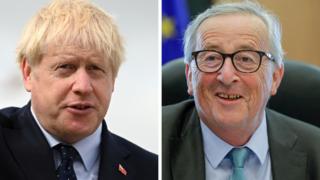Brexit: UK will reject any delay offer, PM to tell Juncker
 Image copyright Reuters, EPA
Image copyright Reuters, EPA The UK is not prepared to delay Brexit beyond the 31 October deadline, Boris Johnson will tell European Commission President Jean-Claude Juncker later.
The lunchtime meeting in Luxembourg will be the first time the pair have met since the PM took office in July.
Foreign Secretary Dominic Raab said the PM would stress he wanted a deal, but there had to be “some finality” to it.
But ex-minister David Gauke said there were no new detailed plans to replace the controversial Irish backstop.
The EU’s chief Brexit negotiator Michel Barnier will also attend the meeting in Luxembourg, while Mr Johnson will be accompanied by Brexit Secretary Steve Barclay and Downing Street’s Brexit representative David Frost.
Last week MPs passed a law that would force the prime minister to ask the EU for an extension to the 31 October deadline if a deal was not agreed by 19 October.
Ministers have insisted the UK will obey the law while continuing to maintain that the UK will leave on Halloween, whatever happens.
Mr Johnson told the Mail on Sunday that, on that date, the UK would break out of its “manacles” like cartoon character The Incredible Hulk – with or without a deal.
And a Downing Street source said he would make clear to Mr Juncker that “he would not countenance any more delays” beyond 31 October.
“The PM will stress to Mr Juncker that, while he wants to secure a deal, if no deal can be agreed by October 18 his policy is to leave without a deal on October 31 – and reject any delay offered by the EU.”
The BBC’s political editor Laura Kuenssberg said the whole issue of whether the UK had the legal right to leave on 31 October, come what may, could end up in court.
The prime minister’s optimism about getting a revised Brexit deal is not shared on the EU side.
Yes, the talks with the UK are becoming more focused and homing in on specific ideas, such as how European rules on plant and animal health could apply in Northern Ireland after Brexit.
But the UK’s proposals are seen as vague, insufficient and – according to one official – “like last night’s mac and cheese with fresh parsley scattered on top”.
And there’s still scepticism in Brussels that the UK is serious about getting an agreement.
There are also conflicting views about the role of Jean-Claude Juncker, the soon-to-be former president of the European Commission.
In the UK, there’s a belief that he wants a deal to crown his final months in office but European diplomats question whether he would want one of his final acts to be forcing Ireland into a major climb-down over the backstop.
‘Posturing’
Reports have suggested Mr Johnson is considering a plan to keep Northern Ireland more closely aligned to the EU after Brexit, as an alternative to the current Irish backstop.
The backstop is the controversial policy in the existing withdrawal agreement, rejected three times by MPs, which would require the UK to follow the EU’s customs rules to ensure there are no physical checks on the border between Northern Ireland and the Republic.
The Democratic Unionist Party – which supports the Conservatives in Parliament – has rejected any plan that would see Northern Ireland treated differently to the rest of the UK.
Writing in Monday’s Daily Telegraph, Mr Johnson said he believed he could strike a deal with the EU within weeks and was working “flat out to achieve one”.
“If we can make enough progress in the next few days, I intend to go to that crucial summit… and finalise an agreement that will protect the interests of business and citizens on both sides of the channel, and on both sides of the border in Ireland,” he wrote.
Many MPs have questioned how serious the government is about getting a deal, former justice secretary David Gauke saying “detailed proposals” had yet to be put forward.
“It still remains the case the UK government has not produced detailed proposals as to how it wants to replace the Irish backstop,” he told Radio 4’s Today.
‘Posturing’
But Mr Raab said claims from the EU side that the UK was dragging its feet were part of the “tactical posturing that goes on in any negotiation”.
He told Today that the UK had been clear the “anti-democratic backstop” had to be removed from the withdrawal current agreement and the outline of future trading relationship set out in the political declaration had to be much more ambitious.
“The EU knows our position. Lots of the detail has been talked through at technical and political level,” he said. “The framework is very clear.
“But of course the nature of these negotiations is that there will be a tendency to rubbish things we put forward in order to exact further demands. We are not going to get involved in that.”
On Sunday, Mr Juncker told German radio that timing was running out and no “patriotic” British person would wish for a no-deal Brexit because it would leave the country in a “mess”.
And, in an update to the European Parliament last week, Mr Barnier said that while “the UK has shown a desire to intensify contacts… we will see in the coming weeks if the UK are able to give us concrete proposals in writing, which are legally operable”.
The week ahead
Monday: Boris Johnson meets European Commission President Jean-Claude Juncker for Brexit talks in Luxembourg
Tuesday: The Supreme Court begins to consider the legality of Mr Johnson’s decision to suspend parliament until 14 October
Wednesday: The European Parliament to debate Brexit





